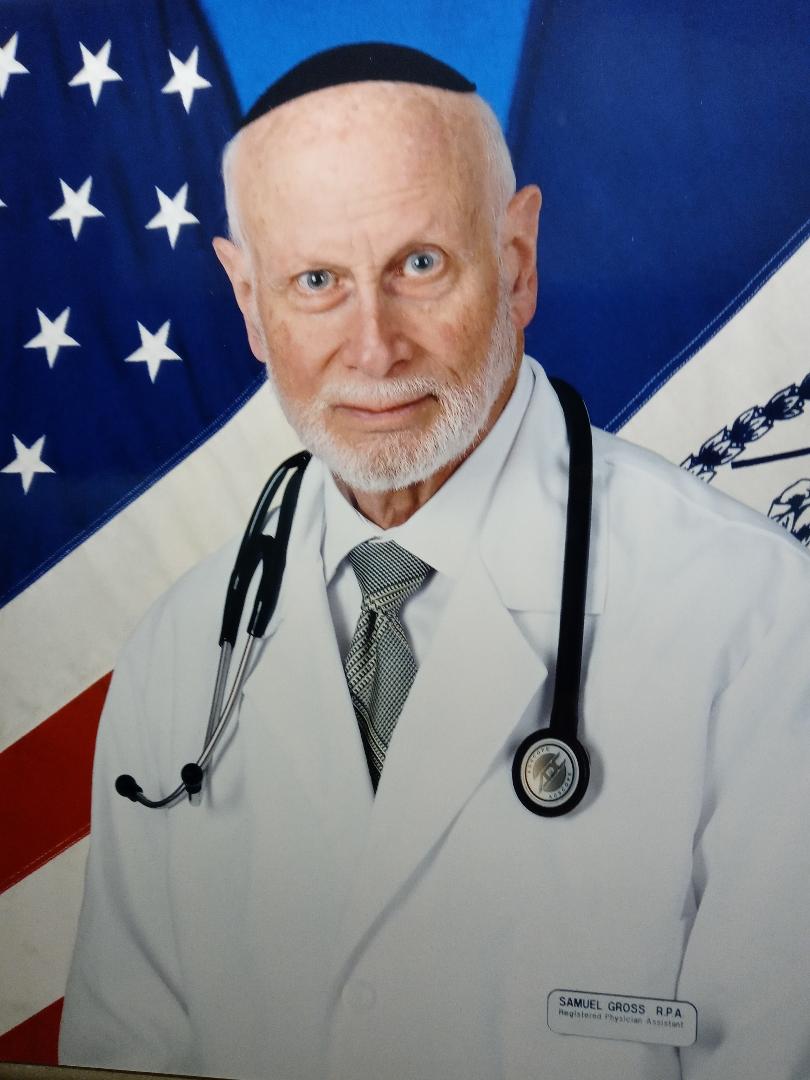From Photographer to Physician Assistant
Samuel Gross (Touro PA ’87) Returned to School to Embark on a Second Career with Unlimited Possibilities

In his mid-thirties, Samuel Gross decided on a career change. A successful graphic designer and photographer, Gross had been hired by Peninsula Hospital Center to photograph their doctors in surgery. Between shooting sessions, Gross realized that he was interested in medicine.
Given his age, Gross said he initially considered becoming a surgical technician, but after a call with Shlomo Twersky, the head of Touro’s Physician Assistant program at the time, he decided to become a PA.
“It was a diverse population,” recalled Gross about the class. “We had young people who had just got out of college and people in my age group and folks that were even older than I. We had great teachers like Dr. Nadja Graff and the late Rabbi Dr. Moses Tendler. It was very exciting to learn with all these different people. We all had the same dream to become PAs.”
The hardest part of PA school, Gross said, was deciding which of the seven job opportunities he wanted to take once he graduated in 1987.
From the First PA to the Chief of PAs
Gross’s first position was as a surgical PA in The Brooklyn Hospital Center. He was the first PA the hospital had hired. “Some days I had 16-hour shifts, other times a 24-hour shift. It was quite challenging, but I loved every minute of it,” said Gross. “Since I was their first PA, I wanted to make a good impression.”
After a year, a position opened up in Peninsula Hospital, the hospital where his initial interest in medicine blossomed. He joined the institution and remained there for 23 years, eventually reaching the position of Chief PA for the hospital. “Anyone who had any kind of elective surgery in the hospital came to see me seven days prior to the procedure,” explained Gross. “I had to evaluate, examine, and do full physicals on all the patients. I had to order lab tests, x-ray, and go over the anesthesia protocol. On the day of the surgery, I would advise the surgeons and the anesthetists and make sure everything was correct. In 23 years, not one patient had a bad experience, and no one died and that made me feel quite good.”
In 2011, the hospital declared bankruptcy and laid off the majority of its employees.
“We were a community hospital—so many people from the neighborhood worked there,” said Gross. “We were one big family, and it was a very traumatic experience.”
Medical Help for the NYPD
Gross said he was fortunate enough to be offered early retirement and he took it. Three years later, Gross grew bored with the retiree life and re-entered the workforce as a PA for a medical clinic in downtown Manhattan. (His retirement only precluded him from working in unionized hospitals, not in the field generally.)
Four years ago, he joined the New York Police Department’s Medical Division. Gross served as part of a mobile health clinic that travelled from precinct to precinct offering free medical checkups, evaluations, and physicals to members of the police force.
“It was a wonderful position,” explained Gross. “The officers I met were so happy and they couldn’t get over that they had a medical professional that was dedicated to them. Typically, they saw their primary care physician for five minutes, but a PA has the time and ability to answer their questions and help them deal with whatever issues they’re facing.”
A year ago, Gross transferred to the NYPD Counter Terrorism Bureau, where he examines and provides services to members of the police force who volunteer for counter terrorism training.
“I’ve met so many great people,” said Gross. “I see sergeants, regular police officers, captains, and lieutenants. I can’t believe how dedicated they are. Every day they say goodbye to their wives and family and don’t know if they’re going to see them again at the end of the day. They’re willing to lay down their lives to protect us and for me to be overseeing their medical health and making sure they are well is the biggest satisfaction I can have.”
The Makings of a Good PA
Despite the more than thirty years that have elapsed since he entered the field, Gross still speaks of his work with the same warmth and enthusiasm he’s always had for the profession. “I’m 74 and I’m still working,” said Gross who added that he has no plans to retire full-time.
“To be a good PA you have to love the career and be willing to give of yourself,” continued Gross.
After seeing the pleasure and satisfaction her father took in his career, Gross’s daughter became a PA as well. And like her father, she loves her work.

